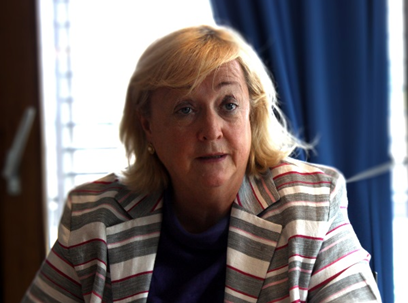Monica McWilliams joins Interpeace’s Governing Council

Interpeace is pleased to welcome Monica McWilliams as a new Member of its Governing Council, the organization's highest decision-making body. Professor of Women's Studies at the Transitional Justice Institute of the University of Ulster and co-founder of the Northern Ireland Women's Coalition political party, Ms. McWilliams played an instrumental role in the Multi-Party Peace Talks, which led to the Good Friday Agreement. She possesses a wealth of experience in conflict resolution and violence reduction, not only from the Northern Ireland peace process but also from her work in various contexts around the world. Ms. McWilliams' expertise in gender-related issues in conflict-affected societies and the role of women in peace processes is also of great value for Interpeace's work.
While in Geneva to attend her first Interpeace Governing Council meeting, Ms. McWilliams took a moment to talk to us about her thoughts on peacebuilding and her motivations for joining Interpeace.
"I have known about Interpeace's work for some time and I am well acquainted with the resources and material the organization produces. I am looking forward to supporting Interpeace's mission, which is closely linked to my work, particularly in the area of gender-based violence and in advancing conflict resolution processes from the grassroots up. It is also an opportunity to connect my peacebuilding work and experience at the local level with current practices at the international level."
Having served six years as Chief Commissioner of the Northern Ireland Human Rights Commission, with a mandate to deliver advice on a Bill of Rights for Northern Ireland, Ms. McWilliams has an acute understanding of the challenges and the long-term commitment that peacebuilding processes involve. We asked her what, in her view, were the aspects of a peacebuilding process that require most attention.
"I see lasting peace as a wagon with four wheels. Constitutional arrangements, security sector reform and social and economic development are the three wheels which are generally given priority. But the wagon cannot be operational without its fourth wheel, which is the most difficult to build, but also the most important: social cohesion, building a true transformation that includes everyone, and ensuring that the violence doesn't reoccur in the future."
"These efforts not only require financial support, but a lot of expertise in terms of facilitating the process, and Interpeace pays particular attention to this component of peacebuilding, which I think is noteworthy. Expectations are high and words like inclusiveness are easily spoken but making them happen is challenging. When we signed the peace agreement, I said: 'the hard work starts now.' Peace agreements often take more time to implement than they took to negotiate."
Ms. McWilliams then went on to tell us about another aspect of peacebuilding which has been a focus of her work: women's participation in peace processes.
"Despite being extremely active peacebuilders and leaders at the informal level, women in conflict-affected societies often play much less prominent roles at the formal political level. I have seen the difference women make when they participate in peace processes, even though they do not get much out of it in terms of power sharing. But there are several important reasons that justify better inclusion of women at the official level as well. Women are affected differently than men by conflict, notably because of the sexual and psychological violence they have to face. When deciding on the future of a society, it is also essential to have equal representation and not exclude any major sections of the population. Women occupying decision-making positions are strong role models as well and can play an important part in conflict transformation."
Finally, we asked Ms. McWilliams to share her thoughts on what peace means to her.
"Peace needs to go hand in hand with justice if it is to be sustainable. A peaceful society is one where no one will do serious harm – personally or politically – to someone because they are perceived to be the 'other.'"
Outgoing Governing Council Members
Interpeace would also like to extend its deep appreciation to outgoing Governing Council Members Sheikha Hind bint Hamad Al-Thani and Mabel van Oranje for their outstanding contribution to the organization. Their insightfulness and active engagement have lastingly contributed to advancing Interpeace's mission. Their vision and meaningful inputs have left their mark on the organization and we look forward to continuing our collaboration through other channels towards our common goal of building lasting peace.
